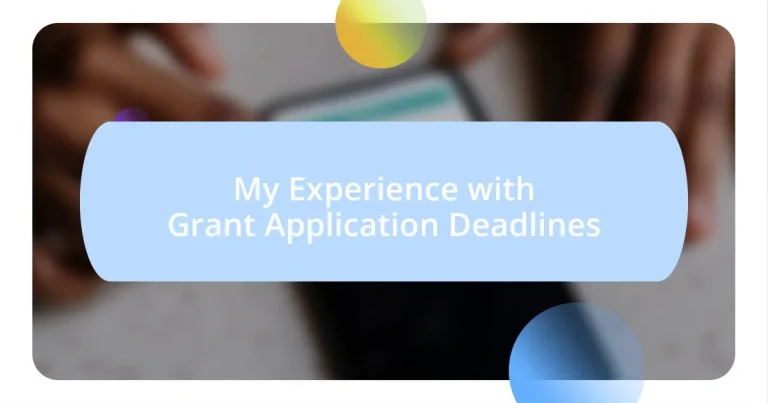Key takeaways:
- Understanding timelines and planning ahead is crucial to avoiding last-minute stress and ensuring successful grant applications.
- Timely submissions demonstrate professionalism and allow for thorough review, which can enhance the quality of applications.
- Effective strategies include breaking the application into smaller tasks, utilizing digital tools for organization, and allowing flexibility in the process.
- Reflecting on the application process fosters growth and improvement in time management and creativity for future applications.
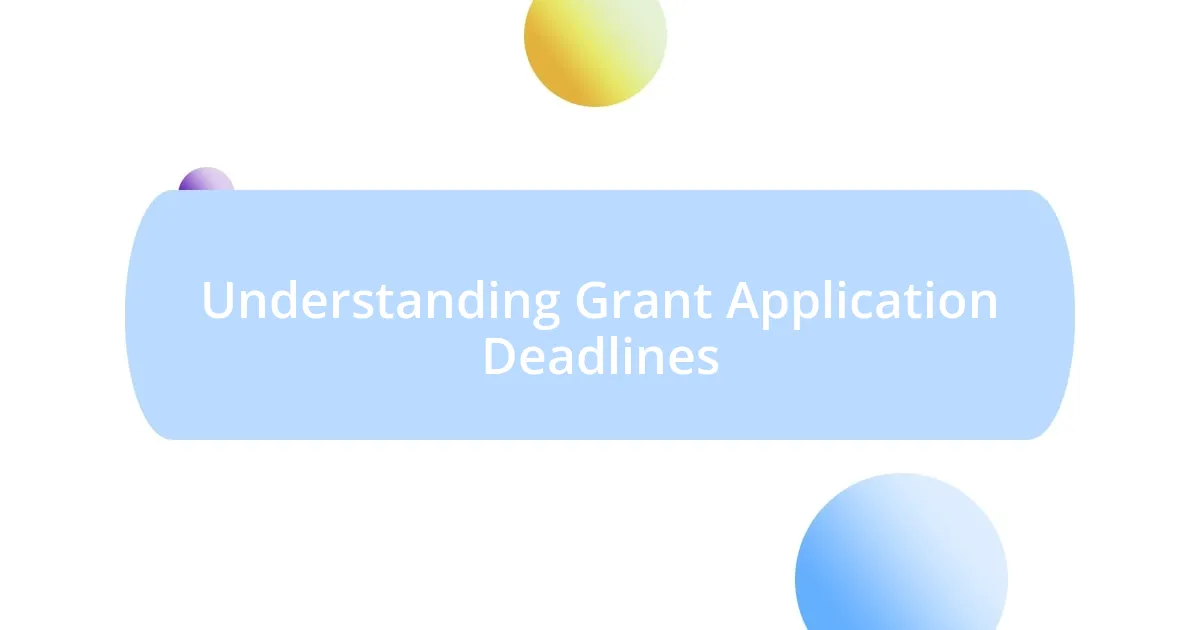
Understanding Grant Application Deadlines
When I first faced grant application deadlines, I felt a rush of anxiety mixed with excitement. The sheer number of deadlines can be overwhelming; I often wondered, “How can I possibly keep track of them all?” What I’ve learned is that understanding these deadlines is more than just marking dates on a calendar—it’s about creating a manageable plan.
One deadline that sticks with me was for a project I was passionate about. I recall marking it on my calendar, but when the day arrived, I realized I had miscalculated the time it needed. I felt that familiar knot of guilt tighten in my stomach. This experience taught me that every grant application has its own unique timeline, and anticipating those points can help avoid last-minute stress.
Additionally, there’s often a pre-submission period that’s crucial for gathering documents and feedback. I remember one time, a colleague handed me feedback just a day before the due date. While I appreciate the input, it pushed me to my limits! So, I encourage you to factor in buffers when planning—you’ll need them to dodge those last-minute scrambles.
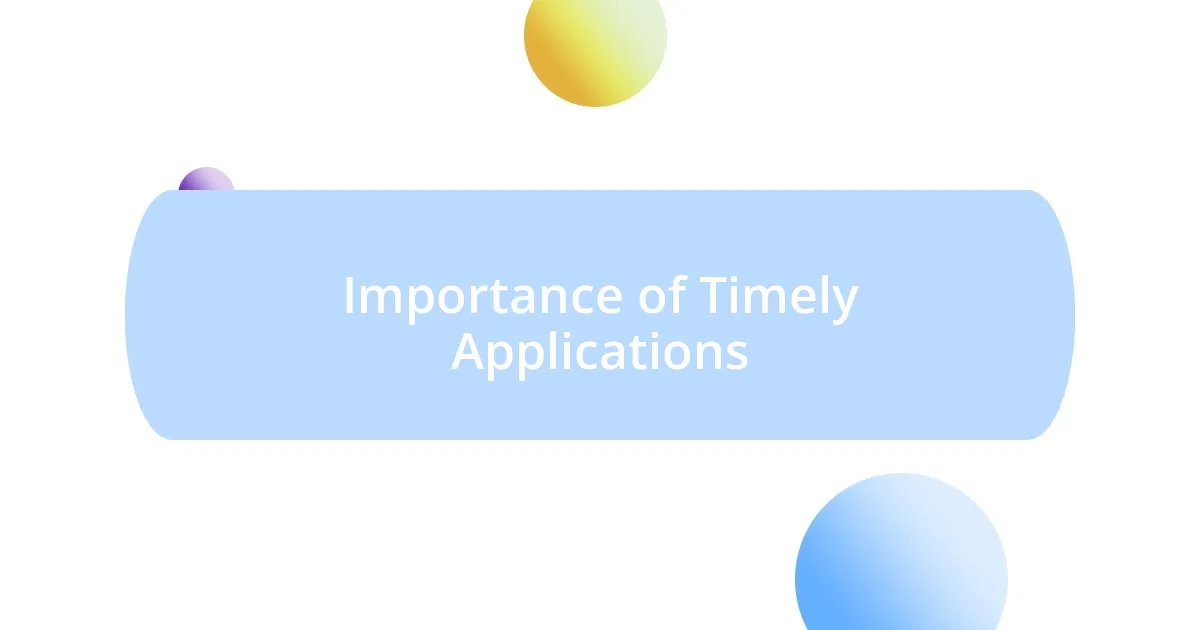
Importance of Timely Applications
Timely applications are critical in the world of grants. I once applied for funding for a community project, and I distinctly remember the sense of urgency as the deadline approached. Submitting on time not only demonstrates professionalism but also reflects respect for the funding body’s schedule.
In one instance, I watched a colleague miss a funding opportunity because they submitted their application a few hours late. It was heartbreaking; they had put in so much effort, yet their application was disqualified. From this experience, I realized that every moment counts, and the consequences of tardiness can mean the difference between success and failure.
Moreover, meeting deadlines allows for a more thorough review process. I always make it a point to complete my applications ahead of time, allowing myself a cushion to review and refine. This practice has not only improved the quality of my submissions but has also reduced my stress levels tremendously. Have you ever felt that adrenaline rush right before a deadline? I know I have, and I prefer to avoid it whenever possible.
| Aspect | Timely Application |
|---|---|
| Professionalism | Demonstrates respect for the funding body |
| Opportunities | Avoids missing crucial funding chances |
| Quality of Submission | Allows for thorough review and refinement |
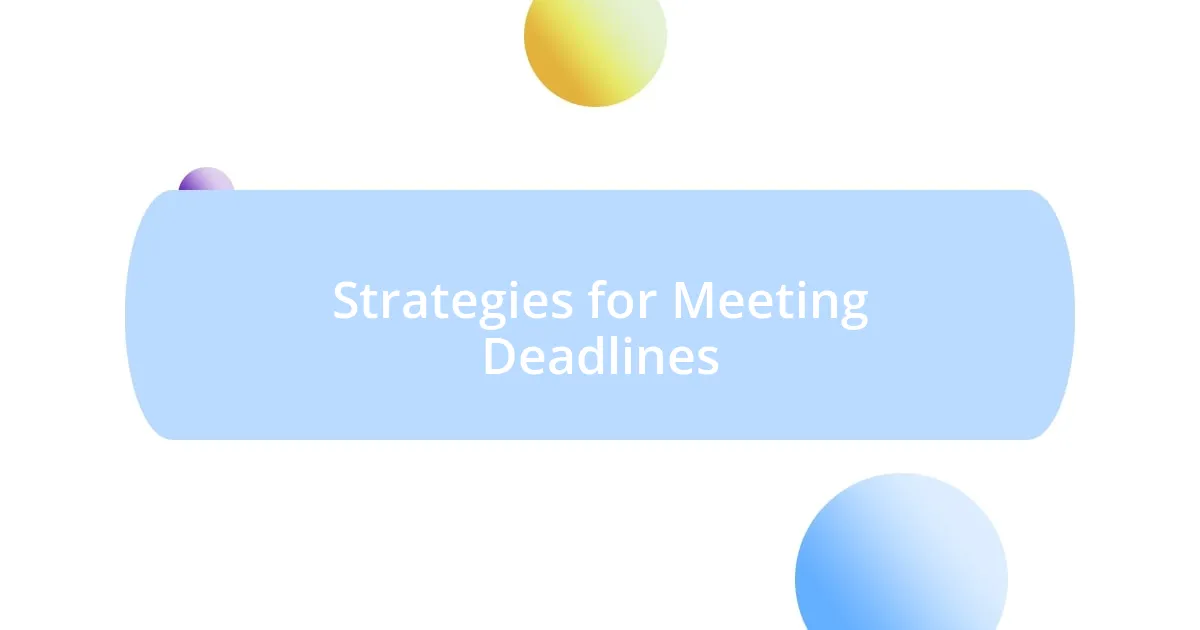
Strategies for Meeting Deadlines
Finding effective strategies to meet grant application deadlines has been a game changer for me. One technique I’ve adopted is breaking down the application process into smaller, manageable tasks. For example, instead of viewing the entire application as a daunting mountain to climb, I tackle it piece by piece. This has helped me not only stay organized but also feel more accomplished along the way. I fondly remember the exhilaration I felt when I submitted sections early; it was as if I was reclaiming time.
To enhance your approach, consider these strategies:
- Create a Timeline: Set specific dates for each section you need to complete and stick to them.
- Regular Check-ins: Schedule brief progress reviews with yourself; they can help keep your motivation high.
- Stay Flexible: Allow for changes; life happens, and adapting your plan can prevent panic.
- Utilize Tools: Employ project management tools or simple lists to track your progress and deadlines.
Implementing these strategies has transformed how I handle deadlines, reducing stress and improving my overall process. These days, I don’t just meet deadlines; I embrace them with confidence and clarity.
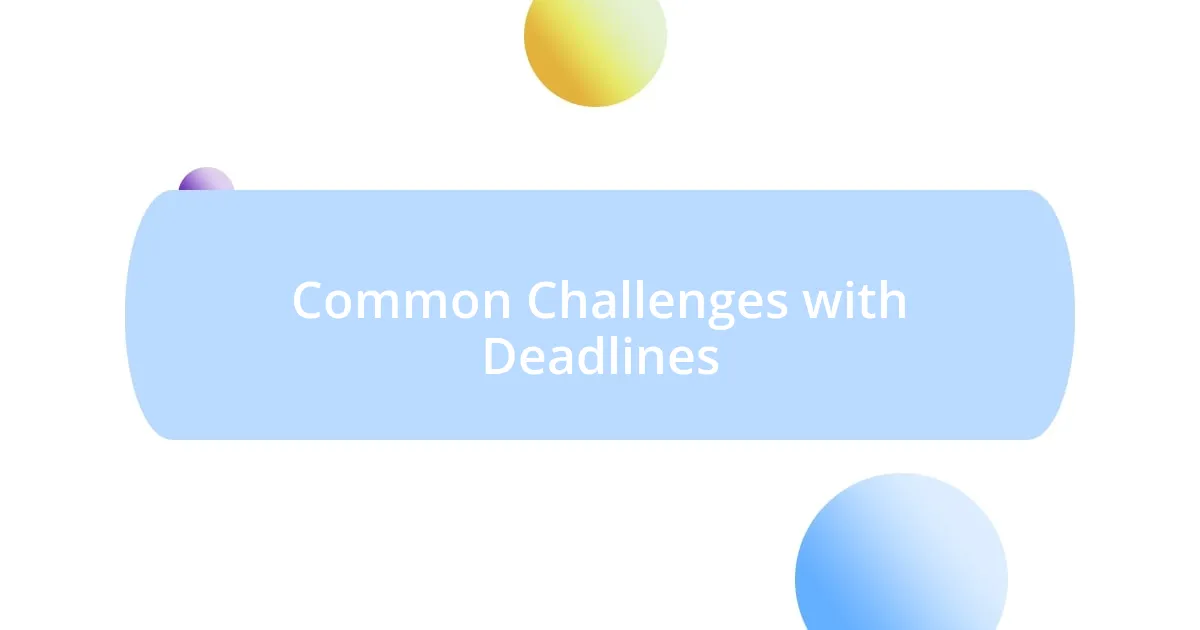
Common Challenges with Deadlines
Facing grant application deadlines can be incredibly stressful. One challenge I’ve grappled with is the overwhelming nature of multiple simultaneous deadlines. I still remember the week I had three major applications due. I felt like I was juggling flaming torches, and despite my best efforts, I couldn’t help but wonder: how could anyone manage this without feeling completely overwhelmed? Ultimately, I realized it required meticulous planning and prioritization to keep my sanity intact.
Another common hurdle I’ve encountered is the unpredictability of the review process. Even when I thought I had everything in order, unexpected feedback could come along at the last minute. During my first major grant application, I remember receiving suggested edits just days before the deadline. It sent my heart racing—talk about a test of adaptability! Have you ever been in a similar crunch? I found that remaining flexible and focused made all the difference, even if it felt chaotic at times.
Then there’s the ever-present battle against procrastination. I’ve often thought about why I allow myself to be distracted by less important tasks as deadlines loom. It’s as if that pressure can tempt us to deviate from our main goal. I vividly recall a day where I spent hours organizing my workspace—anything to avoid tackling a particularly daunting section of an application. Recognizing this pattern helped me develop more productive habits. Can you relate to this feeling? Turning redirecting energy into focused work can truly enhance efficiency and ultimately lead to a successful application.
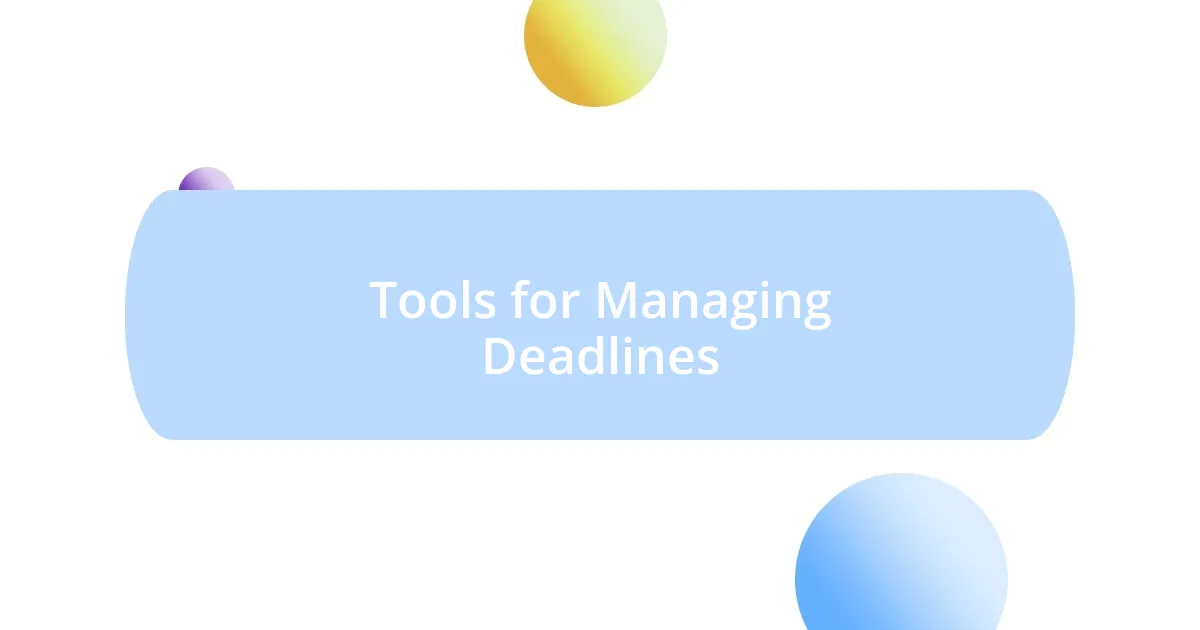
Tools for Managing Deadlines
To effectively manage deadlines, I’ve found that utilizing digital tools can really streamline the process. For instance, I rely heavily on project management software like Trello. It allows me to visualize my tasks in a way that feels rewarding every time I check off an item. Have you ever felt that rush of satisfaction when a task is completed? That simple act of checking a box can be a motivational boost during those hectic weeks leading up to a deadline.
Another tool that I swear by is Google Calendar. It’s more than just a scheduling app for me; it’s my strategic partner. I set reminders for various milestones and let it nudge me as deadlines approach. I’ll never forget the time I woke up two days before a submission, only to be surprised by a looming due date. Thankfully, my calendar had my back, reminding me to stay on track. A small tool like this can truly make a huge difference in avoiding last-minute panic.
Beyond digital solutions, I find that using good old-fashioned bullet journaling is incredibly effective as well. There’s something therapeutic about writing down my tasks by hand, almost like a ritual. Each time I list out what needs to be done, it grounds my thoughts and aligns my focus. Have you tried journaling? I often find that it not only helps me clarify my goals but also allows me to reflect on my progress. Engaging with these tools has transformed my approach—not only do I meet deadlines, but I often feel empowered by them.
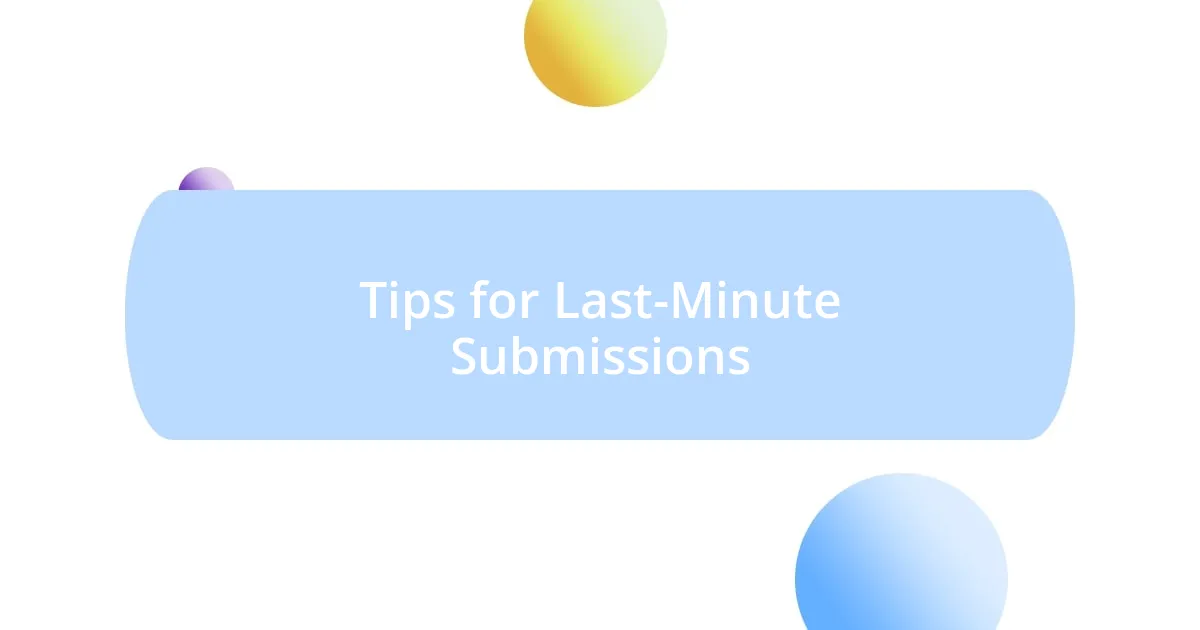
Tips for Last-Minute Submissions
When it comes to last-minute submissions, staying calm is crucial. I remember a particular occasion when I had just hours left for an important application. Instead of panicking, I took a deep breath, prioritized the essential sections, and tackled them one by one. Have you ever noticed how a bit of focus can turn chaos into clarity? By breaking the task into smaller chunks, I managed to push through and submit a polished application.
Another tip is to double-check your submission materials early, even if time is running out. I once submitted a grant application with a missing document simply because I rushed through my review. The sinking feeling when I realized my mistake was gut-wrenching! Now, I make it a habit to keep a checklist handy and confirm that all documents are there before hitting the submit button. It’s a simple step, but it can save you from that heart-dropping moment of regret later on.
Lastly, I’ve learned to embrace collaboration in the final hours. For instance, reaching out to a colleague for a quick review can provide fresh eyes on your work. I recall a late-night phone call where my friend caught an error I hadn’t seen and helped me rephrase a confusing section. Instead of feeling alone in the rush, partnering with someone can foster a sense of teamwork and bolster your confidence. Have you considered how camaraderie can ease the pressure during these tense moments? It can truly transform the mad dash into a more manageable endeavor.
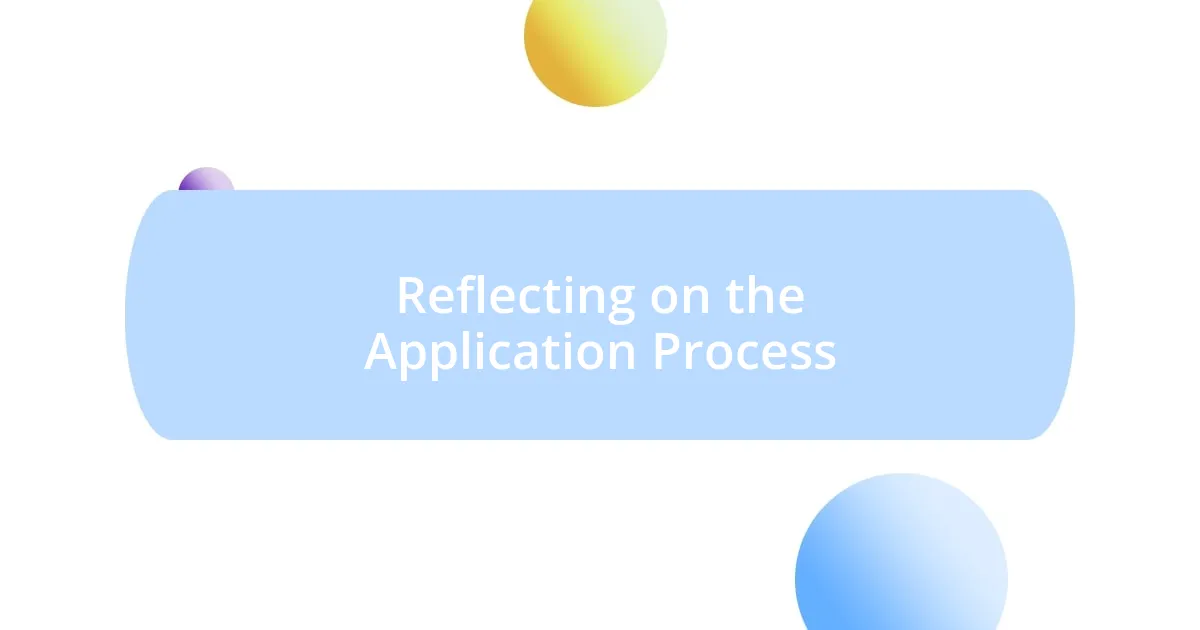
Reflecting on the Application Process
Reflecting on the application process, I often find myself pondering the blend of exhilaration and anxiety that accompanies it. There’s something about wrestling with deadlines that pushes me to confront my own resilience. I can remember the rush of adrenaline as I poured my thoughts onto paper, feeling both anxious about the ticking clock and exhilarated by the ideas flowing out—doesn’t that blend of emotions feel all too familiar when you’re on a tight deadline?
As I look back, I realize that each step of the application journey taught me patience and dedication. I have often been surprised by the importance of giving myself space to breathe. One time, after working non-stop for what felt like days, I took a short walk and found clarity. That brief moment away from my desk allowed me to approach my work with fresh perspective and renewed energy. Don’t you find that sometimes, stepping away can lead to the best insights?
What truly stands out to me is the importance of self-reflection throughout the process. After submitting an application, I always take a moment to evaluate what went well and what I could improve. For instance, after one particularly grueling experience, I took stock of my time management and realized I had underestimated the creative process. It prompted me to prioritize brainstorming sessions earlier next time. Have you ever taken the time to analyze your approach? Those reflections, however small they may seem, can guide you to grow and refine your future applications.












